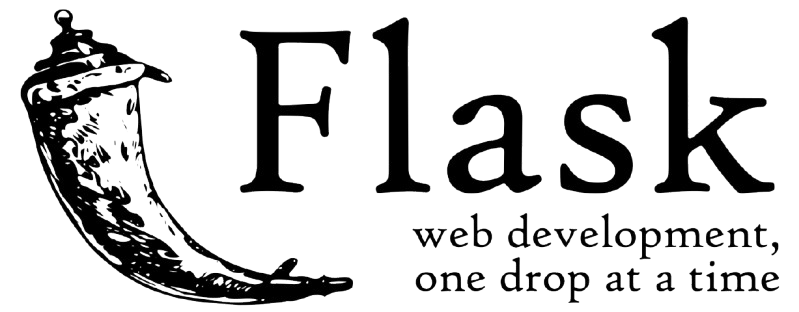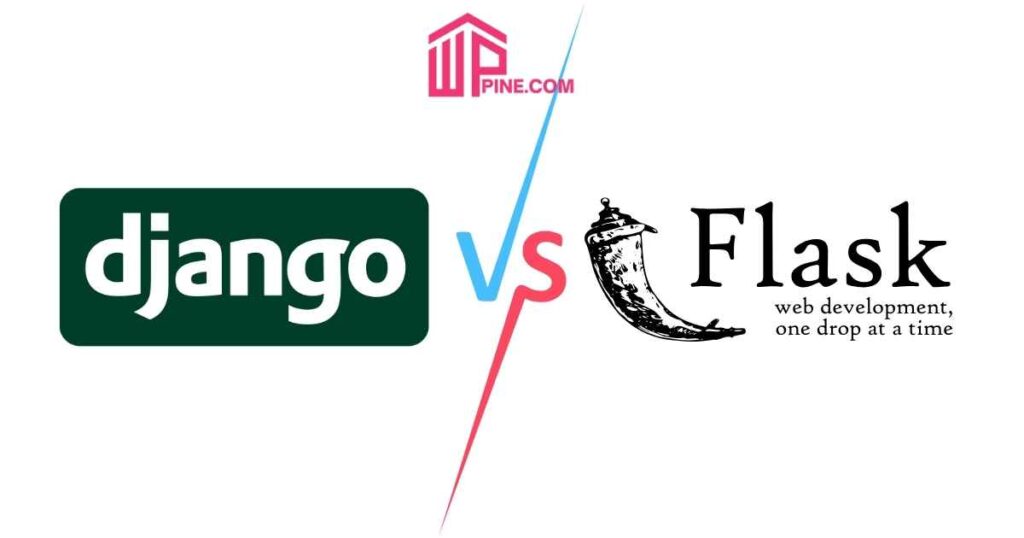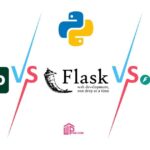Python is very popular for web development, and its frameworks Django and Flask are widely used in the industry. The comparison of “Django vs Flask” will help you choose the right framework for your project. Come, let us understand them in detail.
1. What is Django and Flask?
What is Django?

Django is a full-stack, and high-level framework for developing websites in Python. Its approach is “batteries-included”, meaning it has many built-in tools and libraries that support rapid development and clean code.
What is Flask?

Flask is a micro-framework that comes with a lightweight and minimalistic design. It is ideal for small and medium-sized projects and is popular for its simplicity and flexibility. Flask has few built-in features, but you can add custom functionality through extensions.
2. Key Features Comparison
Key Features of Django:
- ORM (Object-Relational Mapping): A system that handles your data and database easily.
- Built-in Admin Panel: Managing the project becomes easy.
- Built-in Authentication: Handles security and permissions for user management.
- Templating System and URL Routing: Helpful for dynamic websites and clean URLs.
Key Features of Flask:
- Minimalist and Simple Design: Provides only essentials.
- Jinja2 Templating: Combines HTML and Python code.
- Werkzeug Toolkit: Handles HTTP requests and responses.
- Flask supports extensions, which provide options for customization.
3. Pros & Cons Between Django vs Flask
Django’s Pros:
- Rapid Development: Built-in features make development fast.
- High Security: Security features like CSRF, and XSS protection are included.
- Scalability for Large Projects: Effective in large-scale apps.
Django’s Cons:
- Steep learning curve: Might be a bit complex for beginners.
- Less Flexibility: Django has a rigid structure that limits customizations.
Flask’s Pros:
- Lightweight and Flexible: Suitable for simple and custom projects.
- High Customizability: You can add required functionalities through extensions.
Flask’s Cons:
- Limited Built-in Tools: External libraries are required for more features.
- Less Suitable for Large Projects: Not ideal for complex and heavy applications.
4. Django vs Flask: Major Differences
| Aspect | Django | Flask |
|---|---|---|
| Project Scale | Small and lightweight apps | Small aur lightweight apps |
| Security | Built-in high security | Manual configuration |
| Learning Curve | Moderate to high | Beginner-friendly |
| Flexibility | Less flexible | Highly customizable |
| Community Support | Strong aur large community | Flask also has an active community |
5. For which projects are Django vs Flask suitable??
Django’s Use Case:
- E-commerce and Social Media Apps: For large applications and high user volume.
- Content Management Systems (CMS): Django’s CMS-friendly nature is helpful.
- Security-Sensitive Projects: In-built security makes Django ideal.
Flask’s Use Case:
- Small and Simple Websites: For lightweight and quick applications.
- APIs and Microservices: Flask’s flexible design is suitable for APIs.
- Prototypes and MVPs: Flask is ideal for beginners and startups who want to develop prototypes quickly.
6. Performance and Scalability
Performance:
Flask is minimalistic, making it perfect for small projects. Because it has only basic tools and features, it remains fast and responsive. Its setup and structure is simple, so you only have to add what you need.
Django, on the other hand, comes with many built-in features, such as authentication, ORM, and admin interface, which streamline development. But, due to these extra features, it can sometimes be a little slow in performance, especially if the project is small-scale.
So if you are thinking of making a simple and quick project, Flask is a better option. And if you need a complex application that focuses on scalability and security, then Django would be ideal!
Scalability:
Django’s ORM and middleware system is quite scalable and efficient for large-scale projects. Its ORM makes it very easy for you to interact with the database and makes it simple for you to integrate additional features and functionalities with the middleware system. These built-in tools make Django a ready-made solution for large applications.
Flask is also scalable, but here you have to resort to more third-party tools and manual configurations. There is flexibility in Flask, but in larger projects, you may have to manually set up and configure each feature or tool. So if you want to customize cheese to your liking, Flask is better; But if you need a structured and scalable solution, then Django is the way to go!
7. Security Comparison
In Django, you get security out-of-the-box, like CSRF protection, SQL injection prevention, and even XSS protection. These features are included by default, so you do not need to add separate configurations or libraries for them. Due to this, Django is a safe choice for beginners and large-scale applications in terms of security.
In Flask, on the other hand, you won’t find these security features built-in. If you need CSRF or SQL injection prevention, you have to use third-party libraries or manual configurations. The flask is flexible, but it takes a little extra effort for safety. So if there is a high focus on security, then Django is a slightly better option.
8. Development and Deployment
Development:
Django’s structured and modular approach streamlines development, but the learning curve can be high for beginners. Flask’s simple structure is suitable for beginners and rapid prototyping.
Deployment:
The configuration steps in Django deployment are a bit more, but after deployment, it remains stable and reliable. Flask’s deployment is easy and its compatibility with tools like Docker increases its speed and efficiency.
9. Community Support and Ecosystem
Django Community and Ecosystem:
Django has a strong ecosystem and community support that helps beginners and experienced developers. Libraries like Django REST framework make Django’s ecosystem even more powerful.
Flask Community and Extensions:
Flask’s extensions Flask-RESTful and Flask-SQLAlchemy provide add-ons and features to your projects. Flask also has an active community that continues to create guides and tools for Flask-based projects.
10. Decision Time: Django vs Flask?
Final Comparison Table
When deciding between Django or Flask, your choice depends largely on your project’s scale, complexity, and specific requirements. Here’s a quick breakdown table to help you make a choice:
| Feature | Django | Flask |
|---|---|---|
| Built-in Features | Yes, extensive | Minimal |
| Ideal For | Large-scale, complex projects | Prototypes, small apps |
| Performance | Moderate (heavy features) | Fast (lightweight) |
| Security | High | Requires third-party |
| Learning Curve | Steep | Easy |
| Flexibility | Less flexible | Highly flexible |
1. Choosing Django:
- You need a full-fledged web application with many built-in features like authentication, admin panels, ORM, and security.
- Your project is large-scale and will likely have multiple contributors, as Django’s structured setup helps manage complexity.
- Security is crucial in your project since Django includes essential security features right out of the box.
- You prefer faster development for complex applications, thanks to Django’s “batteries-included” approach that minimizes setup time and third-party integrations.
Examples: E-commerce platforms, social media sites, content management systems (CMS), and enterprise-level applications.
2. Choosing Flask:
- You’re building a lightweight or small-to-medium project, like a microservice, RESTful API, or MVP (Minimum Viable Product).
- You prefer flexibility and want full control over which features and extensions to include.
- Performance and simplicity are key, as Flask’s minimalistic design offers speed and lower overhead.
- You want more customization without being restricted by a framework’s default structure.
Examples: Microservices, prototypes, custom APIs, and simple websites where you need flexibility in design and development.
If you’re working on a complex, feature-rich web application with significant functionality, Django might be better suited. For smaller, simpler, and highly customizable projects, Flask offers the flexibility and lightweight structure that will help you move quickly and adapt to changes.
Personal Advice: Between Django vs Flask
Both Django and Flask are fantastic frameworks for web development, but they suit different needs and experience levels. If you’re a beginner, my advice is to start with Flask. Flask is easy to learn, very flexible, and doesn’t come with a lot of rules or built-in features to worry about. It’s lightweight and straightforward, which makes it great for learning the basics of web development without getting overwhelmed. Flask gives you the freedom to build exactly what you want, step by step.
Now, when it comes to Django, it’s also an excellent choice, especially if you’re working on a larger project or need more features built in from the start. Django has powerful tools like an admin interface, authentication, and ORM (Object-Relational Mapping), which handle a lot of the setup for you. This makes Django ideal if you’re ready to build more complex applications and want things to run efficiently with solid security features included.
So, if you’re just starting, go for Flask to get comfortable with web development. Once you’re ready to take on bigger projects or need more advanced features, Django will be a valuable next step!
Conclusion
When the project is large and complex, then the selection of Django is better. Flask is effective for small and lightweight projects, where flexibility and customization are important. You can select your ideal framework from Django vs Flask depending on the nature and requirements of your project.
Additional Resources
For further reading on Data Analysis best practices and tools, consider exploring the following resources:
- Django vs Flask vs FastAPI: Which Is Better For You?
- Django Documentation: Django Official Site
- Flask Documentation: Flask Official Site
- Python For Beginners: Learn Python
- Python For Big Data: How Python Works For Big Data
- Machine Learning vs Meta Learning: Learn The Difference
FAQs
1. Which is better for beginners Django or Flask?
Flask is more suitable for beginners because it is minimalistic and simple. Django has a lot of built-in features, which can be a bit overwhelming for beginners.
2. In which type of projects are Django and Flask used?
Django is best for large-scale and complex projects, like social media apps and e-commerce platforms. Flask is ideal for small projects, MVPs (Minimum Viable Products), and REST APIs because it is lightweight and fast.
3. How does Flask deal with security?
Flask does not have built-in security features, so you have to add CSRF protection, SQL injection prevention, etc., from third-party libraries. These features are available by default in Django.
4. Can Flask also be used for large-scale applications?
Yes, Flask is also scalable, but in large-scale applications, you will have to use additional configurations and third-party tools. These features are already built-in in Django.
5. What is Django’s ORM and why is it so useful?
Django’s ORM (Object-Relational Mapping) is a tool that simplifies interaction with databases. Through this, you do not need to write SQL queries manually, which makes development fast and error-free.
6. Why does Flask provide flexibility?
A Flask is a micro-framework that comes with only essential components. Whatever additional features you need, you can add them from third-party libraries, making Flask highly customizable and flexible.
7. Why can Django be slow in performance?
Django has more built-in features and configurations that handle complexity. These features may sometimes slow down performance in small-scale applications.
8. Is Django or Flask free?
Yes, Django and Flask both are open-source frameworks and are free.
9. Can ORM be used in Flask?
Flask doesn’t have ORM built-in, but you can integrate ORM functionality using libraries like SQLAlchemy.
10. Can both Flask and Django be used in one project?
It is technically possible to combine both frameworks in a single project, but it is not recommended due to complexity and maintainability. Usually, it is better to select one framework depending on project requirements.
These are some mostly asked FAQs about Django vs Flask




Pingback: Django vs Flask vs FastAPI: Which Is Better For You?
Pingback: Basics Steps For Data Visualization - Best Tools & Practice